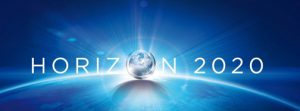Asst. Prof. Lutz Peschke of the Department of Communication and Design is the recipient of two Horizon 2020 project grants from the European Commission. One of the grants resulted from a successful submission in response to the Horizon 2020 “Science With and for Society” call for proposals. Dr. Peschke is the coordinator of one of the projects selected, titled “PandeVITA (Pandemic Virus Trace Application) for Effective Knowledge Transfer Between Science and Society: Inside the Quadruple Helix Collaboration.” Together with partners from Belgium, Finland, Germany and Spain, he will develop the PandeVITA app and analyze societal awareness and acceptance of scientific recommendations and advice mediated through applications for mobile devices. In this project, the legal and ethical frameworks in effect in different countries as well as political decisions made and sanctions applied during the COVID-19 crisis will be analyzed. The investigators will also carry out case studies concerning cooperation between science and society in the health sector, and societal willingness to trust scientific knowledge as well as to participate in the exchange of knowledge with scientists during the pandemic.
One of the grants resulted from a successful submission in response to the Horizon 2020 “Science With and for Society” call for proposals. Dr. Peschke is the coordinator of one of the projects selected, titled “PandeVITA (Pandemic Virus Trace Application) for Effective Knowledge Transfer Between Science and Society: Inside the Quadruple Helix Collaboration.” Together with partners from Belgium, Finland, Germany and Spain, he will develop the PandeVITA app and analyze societal awareness and acceptance of scientific recommendations and advice mediated through applications for mobile devices. In this project, the legal and ethical frameworks in effect in different countries as well as political decisions made and sanctions applied during the COVID-19 crisis will be analyzed. The investigators will also carry out case studies concerning cooperation between science and society in the health sector, and societal willingness to trust scientific knowledge as well as to participate in the exchange of knowledge with scientists during the pandemic.
 The other of Dr. Peschke’s projects to receive a Horizon 2020 grant is titled “EUMEPLAT (European Media Platforms): Assessing Positive and Negative Externalities for European Culture”; the proposal was submitted in response to a call for projects relating to the topic “Societal Challenges – Transformations.” Twelve partners, from Belgium, Bulgaria, the Czech Republic, Germany, Greece, Italy, Portugal, Spain, Sweden and Turkey, are collaborating on the project. It will analyze the role of media platforms in fostering or dismantling European identity, focusing on the “platformization” process implicit in the rise of new closed Web architectures and looking at its positive and negative externalities and functional and dysfunctional consequences. To this end, the EUMEPLAT consortium will run a multidisciplinary analysis of platformization in three different areas – news, video sharing and media representation – with the ultimate goal of offering a theoretical synthesis.
The other of Dr. Peschke’s projects to receive a Horizon 2020 grant is titled “EUMEPLAT (European Media Platforms): Assessing Positive and Negative Externalities for European Culture”; the proposal was submitted in response to a call for projects relating to the topic “Societal Challenges – Transformations.” Twelve partners, from Belgium, Bulgaria, the Czech Republic, Germany, Greece, Italy, Portugal, Spain, Sweden and Turkey, are collaborating on the project. It will analyze the role of media platforms in fostering or dismantling European identity, focusing on the “platformization” process implicit in the rise of new closed Web architectures and looking at its positive and negative externalities and functional and dysfunctional consequences. To this end, the EUMEPLAT consortium will run a multidisciplinary analysis of platformization in three different areas – news, video sharing and media representation – with the ultimate goal of offering a theoretical synthesis.
